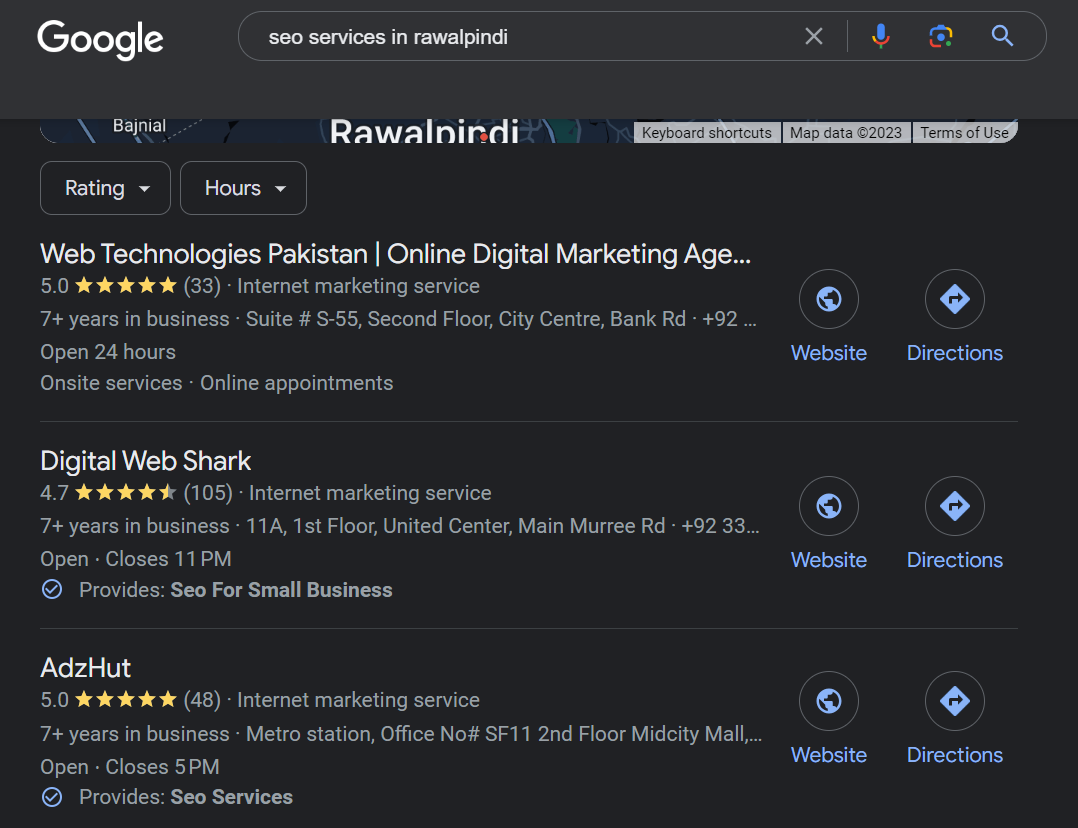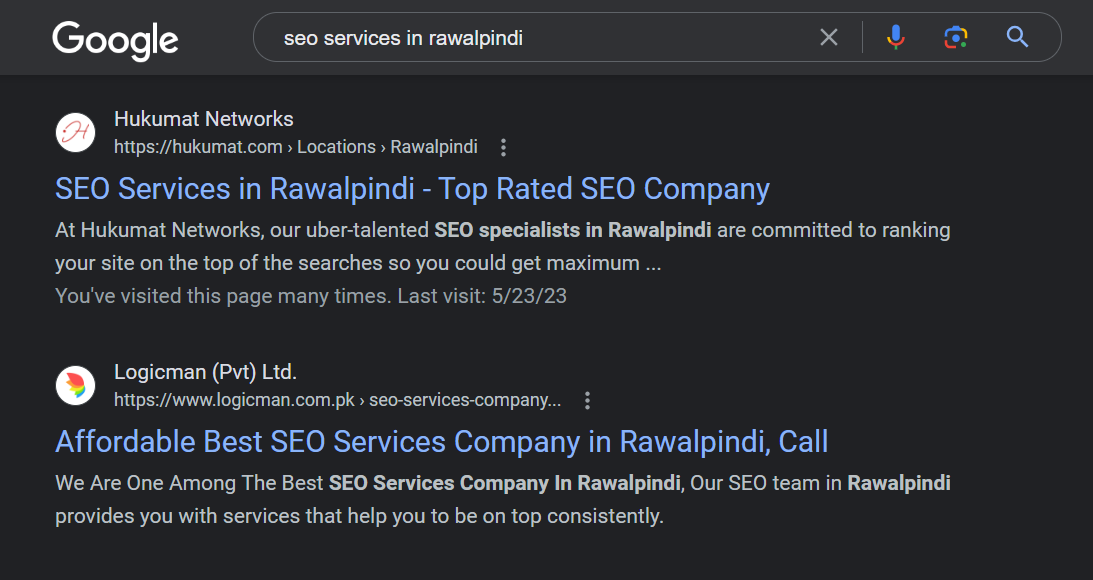Evergreen Local SEO Strategy for Brick and Mortar Businesses
An effective Local SEO Strategy for Brick and Mortar Businesses involves actively managing your business information, optimizing local landing pages, building business citations, and maintaining a positive online reputation. These combined efforts improve the visibility of essential keywords on popular platforms such as Google and Google Maps.
Steps to Higher Local Rankings:
What is Local SEO Strategy for Brick and Mortar Businesses?

Local search engine optimization (SEO) focuses on improving the visibility and ranking of a website in search results that include specific geographical information. This can be seen in queries like “SEO services in Rawalpindi” which often display a set of local listings known as the “Snack Pack” in local SEO terminology. Alternatively, an organic result may appear without the explicit inclusion of the location in the search phrase.
In the provided screenshot, you can identify the 3-Pack of local listings, which typically showcase relevant businesses in the area. Additionally, when you search for any term like service + geographical location as “SEO services in Rawalpindi” below these local listings, you will also find an organic result that is not part of the local listings but still appears in response to the same query.
As discussed earlier, local SEO is not limited to the Snack Pack or local listings; it also encompasses optimizing organic search results with keywords that include geographic phrases. To illustrate, here’s an example of an organic result that appears in response to a search query:

To ensure your business receives maximum visibility in local search results, it’s essential to secure placement in three key areas:
1. Paid Ads (Google AdWords): By utilizing paid advertising through platforms like Google AdWords, you can target specific local keywords and display your business prominently at the top of relevant search results.
2. Maps Packs (Google Maps): Securing a spot in the Maps Pack, which appears within Google Maps, allows your business to be prominently displayed when users search for local services or businesses in a specific area.
3. Organic Results: Optimizing your website and content with relevant local keywords helps improve your organic search rankings, ensuring that your business appears in the standard search results for location-based queries.
To achieve success in these areas, it’s crucial to implement a well-thought-out content strategy that focuses on local relevance, establish a comprehensive business listing plan to ensure accurate and consistent information across various directories and platforms, and actively encourage and manage ratings and reviews to enhance your online reputation. These elements form the core components of location-based search engine optimization.
Step 1 – Business Data Management
An essential aspect of your long-term strategy involves utilizing data aggregators. These are extensive databases utilized by business directories to ensure that information remains accurate and up-to-date. The underlying SEO theory behind these databases is that Google may refer to them during their validation process to confirm whether a business operates physically at a location, rather than being an online-only entity attempting to manipulate local search results.
These databases offer the advantage of enabling businesses to correct data at its source instead of manually fixing inaccurate information across numerous websites, which can be a daunting task.
Before proceeding with this step, it is important to research to identify the most suitable Standard Industrial Classification (SIC) codes for your area. Additionally, you should verify your address against the post office database and ensure you have credits available to pay for each service (although Factual is free, its SEO value is questionable).
Here are the most popular data aggregators, ranked in terms of perceived value:
1. InfoGroup (submit your business) etc
By leveraging these data aggregators effectively, you can enhance the accuracy of your business information across multiple platforms and increase your credibility in local search results.
Step 2 – Local Landing Page Optimization
When it comes to your local landing page, there are several factors that Google and other search engines consider to determine its relevance to location-based search queries. However, it’s crucial to prioritize the experience of the visitors who land on your page and decide whether to stay or go back to Google. If users quickly leave your page, it can lead to a gradual decline in ranking over time.
Here are some elements that users would appreciate seeing on your local landing page:
1. Coupons and discounts
2. Easy-to-use directions (via Google or Apple Maps)
3. Prominent click-to-call phone number
4. Clear hours of operation
5. Service or product menu
6. Ratings and reviews
Based on our experience, here’s what search engines tend to favor:
1. Structured data (a good starting point)
2. Browser title and headline featuring Service Type + City, State
3. Service categories listed on the page
4. Unique content, not simply a keyword inserted into existing content
For a detailed breakdown of other criteria that search engines consider when determining to rank, you can explore the Local Search Ranking Factors study conducted by Moz.
Additionally, here’s an excellent example of a local landing page created by Nifty Marketing, which effectively incorporates the focal points important to both users and search engines to establish relevancy and improve ranking in search results.
2. Business Citations
In the realm of local SEO, citations refer to instances where your business name, address, and phone number (N.A.P.) are mentioned. Similar to how Google considers links for PageRank, the Google Maps algorithm takes N.A.P. into account as part of its scoring criteria to assess the popularity and the authenticity of listings.
During a presentation by Darren Shaw of Whitespark on the impact of citations on local rankings, he found that the law of diminishing returns applies to the number of citations acquired. Therefore, the quality of citations matters more than the sheer number of citations obtained.
Here are the five main sources of citations:
1. Search Engines and Navigation: This includes platforms like Google, Bing, and other search engines where your business information is displayed.
2. Local Social Destinations: Social media platforms that focus on local businesses, such as Facebook Pages, Yelp, and Foursquare, where you can create business listings.
3. General Business Directories: General directories like Yellow Pages, Superpages, and Yelp that cover various industries and business types.
4. Industry Directories: Specific directories catering to your industry or niche, can provide targeted exposure to your target audience.
5. Regional Directories: Local or regional directories that are specific to your location or target market, such as city-based directories or community portals.
By focusing on acquiring high-quality citations from these sources, you can enhance your local SEO efforts and improve your visibility in local search results.
Search & Navigation Engines
Before you submit your data to search engines, it’s advisable to wait for at least two weeks after submitting your information to search aggregators. This waiting period is essential because search engines need to verify the data you provided to them. If they can’t validate the information, all your previous efforts will go to waste.
When you begin the process of provisioning your business on search engines and navigation systems, ensure that you have access to an email address associated with your website. It is commonly believed among SEO practitioners that using an email address linked to your domain (e.g., your_name@yourdomain.com) can make a difference, although there is no concrete proof of this.
Take your time during the submission process and ensure that you fill in every available field. Utilize only your highest-quality images and videos, and craft compelling content for the Introduction sections. Strive to create the most persuasive and engaging content possible.
IMPORTANT! Never try to stuff keywords into your business name. Always use the same business name that you use with the Postal Service and on your DBA or Corporation paperwork. Falsely manipulating your business name in an attempt to achieve higher rankings can lead to penalties in search results.
Here are the search engines you should sign up with, and the process is free for all:
1. Google My Business (List your business on Google)
2. Apple Maps (Apple Maps)
3. Bing Places (List your Business on Bing)
4. Yahoo! Local (claim your business – scroll down to FREE)
5. MapQuest (claim your business)
By signing up with these search engines, you can establish a strong online presence and improve your visibility in local search results.
Local Social Destinations
Just like search engines, local social websites also take into account factors such as chosen categories, authenticity, and other relevant signals when displaying their internal search results. The websites that consistently appear in these results often have a higher chance of appearing in Google search results as well.
Since the Google Pigeon Update in 2014, we have observed that sites like Yelp and Yellowpages tend to rank higher than individual brands for service + geography queries. For instance, if someone searches for “shoe store Anaheim,” these directory websites are more likely to appear prominently in the search results.
This highlights the importance of leveraging local social websites and directories to enhance your online presence and improve your visibility in both internal and external search results. By optimizing your presence on these platforms, you can increase your chances of reaching a broader audience and attracting more potential customers.
Here are a few of the top social local destinations to start with:
- Yelp (submit your business)
- Facebook (create a local business page)
- Amazon Local (create a deal)
- Foursquare / Swarm (submit your business)
- LinkedIn (create a company page)
- Groupon Pages (create a page)
General Business Directories
Non-interactive business directories are gradually losing their appeal since visitors have limited options like printing directions or making phone calls. Consequently, these directories are becoming less engaging and experiencing a decline in traffic over time.
However, if you still find value in these directories and want to increase the instances of your business data for Googlebot to discover during its crawl, you can explore a list of directories that Yext submits to.
Alternatively, it would be more beneficial to focus on industry-specific and regional directories that hold greater relevance. There is a helpful tool called Link Acquisition Assistant by Moz.com, which unfortunately will be retiring soon, that can assist you in this endeavor. In the absence of that tool, you can try using the following queries to discover suitable directories:
Industry Queries to Find Opportunities
1. [Your industry] directories
2. [Your location] directories
3. [Your industry] + [Your location] directories
4. [your industry] directory
5. [your industry] association
6. [your industry] collation
7. [your industry] membership
8. [your industry] organization
9. [your industry] alliance
10. “competitor 1” “Competitor 2” “Competitor 3” -yoursite.com
Regional Queries to Find Opportunities
- {your city} business directory
- {nearby city} business directory
- {your county} business directory
- {your state} business directory
- {your city} blogs
- {your city} tourism
- {your city} information
4. Online Reputation
All the effort you’ve put into completing Phases I to V could be wasted if your potential customers come across low ratings or negative reviews when they search for your business. Negative reviews can have a significant impact and deter potential customers from choosing your business.
So, how can you prevent negative reviews or at least minimize their occurrence? A smart approach is to implement effective point-of-sale planning. For instance, if a customer seems to be having a poor experience, you can provide them with a “Care Card” that includes a link to yoursite.com/care. This allows you to address their concerns promptly and provide exceptional customer service, even if they need to complain to someone who isn’t physically present at your location, such as a corporate office.
On the other hand, customers who have had a great experience can receive a “Share Card” that directs them to yoursite.com/share. This page allows them to choose their preferred rating/review site to share their positive feedback. Additionally, you may want to consider using eKomi, a solution that integrates well with the Google Seller Rating Extension within the Google AdWords platform.
Here is a list of popular platforms where consumers often leave reviews, ranked in order of frequency. Make sure to register your business on each of these platforms and periodically feature them on your Share page:
Rating / Review Websites
- Google Reviews
- Yelp
- Facebook Reviews
- TripAdvisor
- Better Business Bureau (BBB)
- Yellowpages
- Angie’s List
- Foursquare
- Citysearch
- Trustpilot
- BBB.org
- Superpages
- Glassdoor.com (employee reviews)
- Indeed.com (employee reviews)
- Urbanspoon (restaurants only)
- ChamberofCommerce.com
- CitySquares
- EZlocal
- LocalDatabase
- MerchantCircle
- ShowMeLocal
- Topix
- USCity.net
- Where To?
- YellowBot
- Yellowise
- YP.com
By actively managing your online reputation and encouraging satisfied customers to leave positive reviews, you can mitigate the impact of negative feedback and establish a strong online presence that instills confidence in potential customers.
3rd Parties & Monitoring Competition
There are various tools available that can assist you in monitoring and analyzing the business listings of your competitors. If you’re considering using a third-party service to help with submissions and monitoring, you can refer to this useful comparison table to aid in your decision-making process. Some of our recommended tools include:
1. BrightLocal
2. Chatmeter
3. MozLocal
4. Yext
5. UBL
6. Whitespark
These tools offer valuable features to track and assess your competitors’ business listings, allowing you to gain insights and make informed decisions to enhance your local SEO efforts.
Attracting Links for Local SEO
As an expert in your field, you possess the ability to provide informative answers to common questions using engaging illustrations, videos, and helpful advice for those who prefer a do-it-yourself approach. These individuals not only find value in your content, but they also often share it on social media, link to it in their online guides, and may even leave reviews based solely on the quality of your content.
To effectively address the questions people commonly search for on Google, you can utilize tools like eContext to filter search results based on specific queries. Group these questions into relevant themes and prioritize keywords with high search volume. This will help you create a content calendar that caters to these topics.
We recommend planning one post every Tuesday that discusses hot topics or provides industry news commentary. Additionally, on Thursdays, you can publish evergreen articles centered around specific keyword themes. To ensure an engaging user experience, your writer and designer need to collaborate and create content that combines text, images, and if possible, videos.
By following this approach, you can effectively capture the attention of your target audience and establish yourself as a valuable resource in your industry.
Need Help?
If you feel that this article hasn’t equipped you with the necessary tools to excel in local SEO, don’t worry! We have a team of experienced consultants who can provide training and coaching to help your in-house team navigate the process of driving more traffic and generating leads from search engines. To explore this opportunity further and learn more about our services, contact our SEO Professionals. We are dedicated to assisting you in achieving your goals in the realm of local SEO.
